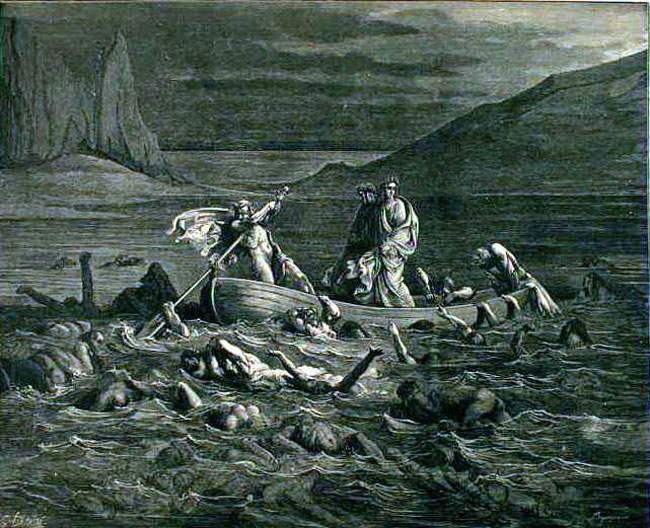Well, this canto is full of some scary imagery. We have a maniacal Phlegyas storming towards Dante and Virgil, assuming they are souls trying to escape this wrathful circle. Phlegyas is the angry boatman on the river Styx (no relation to the prog-rock 70's band of Sail Away infamy). With his entrance we have a lot of fire. Phlegyas is in inferno because he set fire to one of Apollo's temples, and Apollo took offense to this act of pyromancy. Never mind that Apollo raped one of Phlegyas' daughters. However justified the act was, it was done in a frenzy of wrath. Dante and Virgil get a terrifying glimpse of a tower with two flames flickering a signal to another flame far off. Commentators have speculated that the two flames are lit as a signal announcing out unwanted guests, ala the flame network from the Lord of the Rings. But since no other mention was given as to the nature of the flames, that is pure speculation. Fire is an important symbol here. The fire that burns within. The wrath that can erupt in each of us. Dante seems to claim that we all have the capacity to lay a torch to our lives, or souls, just as Phlegyas did. It's that fire that caused Filippo Argenti, a real life Florentine, to slap Dante in the face. Ad it is also that fire that causes Dante to once again betray his own human sensibilities and place yet another historically inconsequential individual in his epic. The short fuses that lead to fires show Phlegyas' instant overeaction when he believes Dante and Virgil are going defecting for nicer circles. It is Dante's own distrust of Muslim religion that he places mosques among the burning muddy residue of the river Styx (a river, in Greek mythology, of fire). We are getting all the signals that this Inferno is quite a different beast that we have previously encountered. These are the major sins. The flames are a deep red. The fallen angels by the thousands gather, incensed by the sight of a mortal free to traverse the land they have been imprisoned in for millenia.
And then Dante does something that for most of the history of literature has been considered a gimmick; poor writing. He steps away fromt eh narrative to address the reader directly. He actually does this several times throughout the Divine Comedy, and every time it is slightly jarring. The angels are threatening Virgil, demanding Dante to stay here while he proceeds. Dante is so nervous and fearful that he jumps out of the poem. The situation seems so dire that Dante needs to stress his own lack of faith that this journey is by no means just a tourist jaunt. The wrathful fire of these lost souls so overwhelms Dante that he needs to again be assured by Virgil that no one can stop them. But the wrathful, their sin so viscerally embodied in the pervasive fire, go so far as to slam the gates to the city of Dite, denying their passageway. This is a moment made for the modern adventure. How will our venturers escape? Who is the mysterious soul that Virgil insists will open the gates for them. One thing is certain, we a reno longer in Kansas.


No comments:
Post a Comment